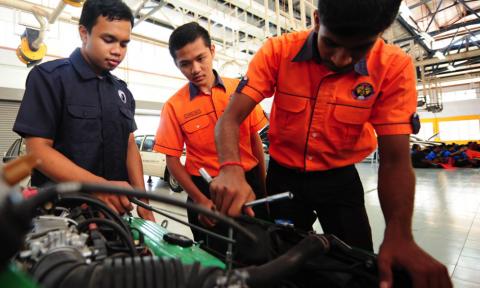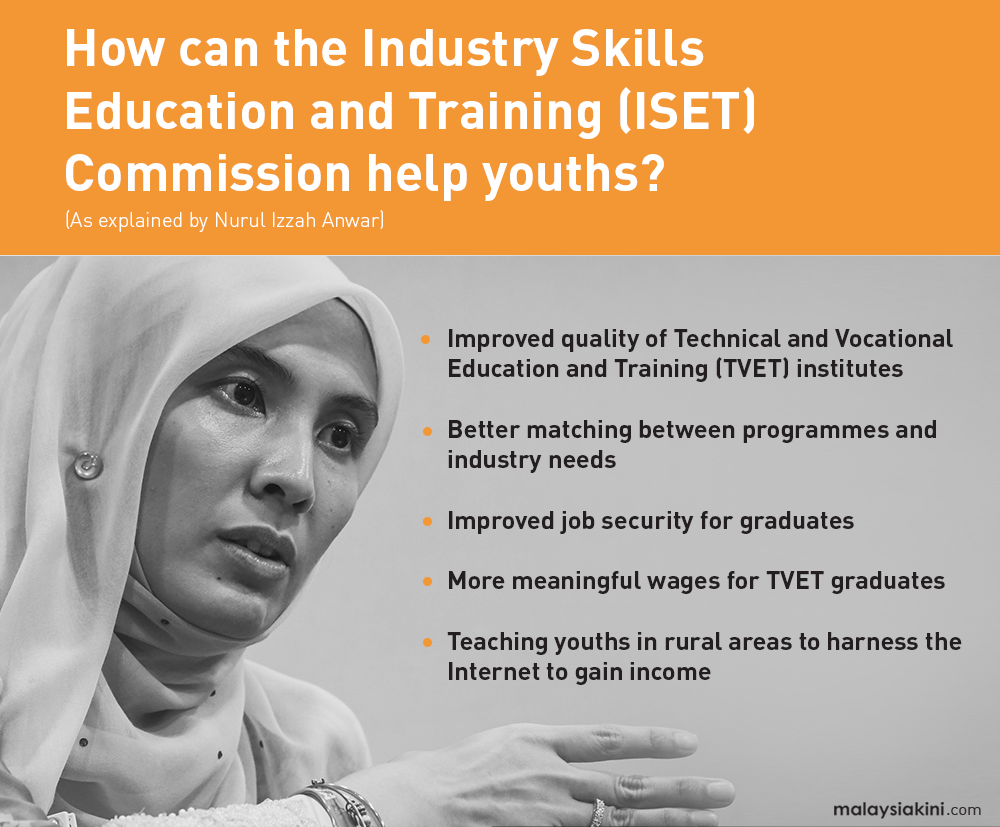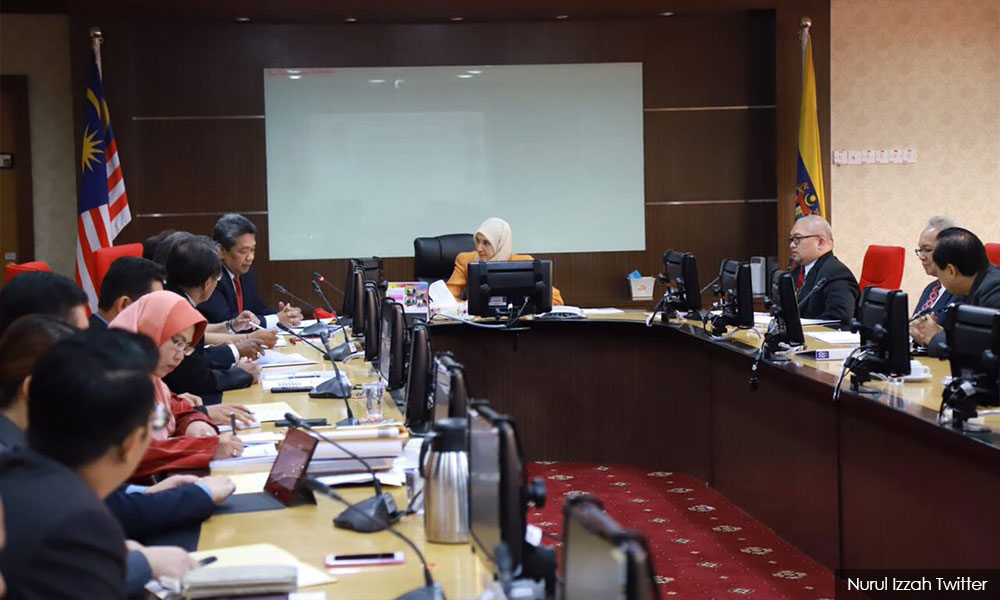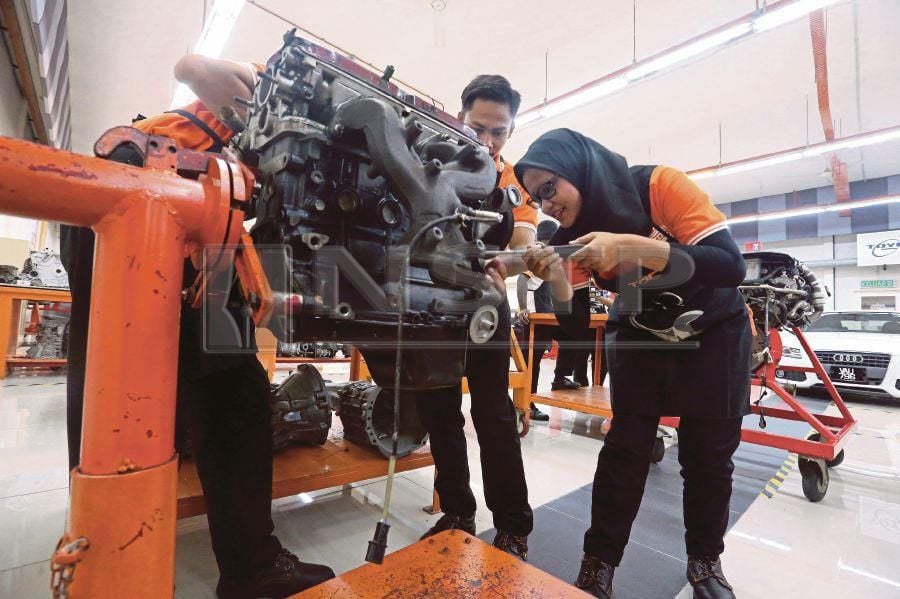ACCORDING to the Education Ministry’s Malaysia Education Blueprint (Higher Education), there will be an increase in demand for an additional 1.3 million Technical and Vocational Education and Training (TVET) workers by 2020 in the 12 National Key Economic Areas identified under the government’s Economic Transformation Programme.
Under the 2019 Budget, the government will set up a TVET fund to create a more competitive environment as well as training programmes to fulfil industry need. Finance Minister Lim Guan Eng, who made the announcement in parliament, saidRM30 million has been allocated to this fund.
TVET programmes in the country are offered at certificate, diploma and degree levels by seven ministries that include the Education Ministry, which offers the most TVET programmes to the highest number of students.
Presently, qualifications for academic (higher education) and vocational education offered by universities, polytechnics and community colleges under the ministry are accredited by the Malaysian Qualifications Agency (MQA), whereas programmes offered by skills training institutions are accredited by the Department for Skill Development of the Human Resources Ministry.
With a renewed focus and direction given by Prime Minister Tun Dr Mahathir Mohamad to fulfil the national agenda of Vision 2020, TVET education strives to provide a skilled Malaysian workforce which can benefit the industry.
It is estimated that 98,000 students sign up yearly to enrol in TVET programmes at 34 polytechnic institutions in the nation.
While the allocated sum for the fund was lauded by TVET providers such as polytechnics, community colleges and technical and vocational colleges as well as industry players, they also expressed their concerns.
Polytechnic and Community College Education Department senior director Zainab Ahmad stressed that the TVET fund is not enough to leverage on.
“Public TVET institutions are not rich organisations. Year after year, we are doing more with less budget allocation, spending more on operations and development.
“It is for us to come up with new curricula to stay relevant to cater to industry demand. However, we also need up-to-date and top-notch equipment, facilities and machineries for the students. Sometimes, we don’t have enough for maintenance or even our day-to-day operational costs,” she said.
“With the TVET fund, we need to allocate for training programmes as well as teaching and learning at 36 polytechnics and 102 community colleges nationwide.
“But we have the passion to nurture our students,” she added.
The department is aware that the industry must come first, hence it sets curricula that meet MQA requirements.
“MQA is an international accreditation agency equal to those in Australia, the United Kingdom and New Zealand.”
Kolej Vokasional Ekonomi Rumah Tangga (ERT) Setapak director Nor A’idah Johari is hopeful that vocational colleges will also get an allocation from the fund.
“We have 90 vocational colleges throughout the country including Sabah and Sarawak. We need to value add our facilities and infrastructure.
“At ERT Setapak, we are focused on upgrading our industrial kitchen and sewing machines so that students will experience the real world environment similar to hotels and the fashion industry.
“For example, our aim is one fashion student, one machine so that they know the tools of their trade,” said Nor A’idah.
University Teknologi Malaysia Corporate Fellow (UTM-Malaysia Petroleum Resources Corporation) Institute for Oil and Gas Adjunct Professor Zulkifli Abd Rani said as the government has a vision to create a 60 per cent TVET workforce by 2020 in line with the country’s aspirations to emerge as a developed nation, a dedicated and right funding is essential.
“The TVET fund is timely as without a dedicated fund, nothing will move effectively and efficiently.
In addition, the management of the fund must be given the utmost attention by all parties involved in TVET enhancement,” added Zulkifli.
Zulkifli, who is Techno Diverge Link Sdn Bhd managing director, said the acronym TVET also stands for Towards Victory in Educational Transformation—the reform of the TVET education system in line with the aspiration of the New Malaysia government.
“We need to ensure that 20 per cent is spent on planning and 80 per cent on execution with 100 per cent commitment on follow-up correction and proactive enhancement.
“Some may argue that the RM30 million allocation for the TVET fund is not enough. But it is an opportunity to work together smartly as one team with common objectives to come up with the desired programmes to meet TVET deliverables with the allocated fund.
“It is better than nothing. We need to ensure the right integration and seamless interface between various key ministries involved in TVET programmes under the purview of the newly set up TVET Coordination Committee led by Nurul Izzah Anwar. Professional members representing regulators from the government, academicians from polytechnics/universities, industry technocrats and consultants as well as non-governmental organisations representatives must be brought in,” added Zulkifli.
Apart from the restructuring and transformation of TVET training programmes, key stakeholders such as the government, polytechnics and the industry need to align and chart the way forward on areas of priority for the courses.
“This is to produce competent and highly skilled graduates to meet industry demand. In my view as a technocrat, the key relevant industries in the current landscape and future prospects which are extremely important to the nation are oil and gas, renewable energy, construction, manufacturing of electrical and electronics products, automotive, aviation, plantation, culinary and hotel management.”
LANDSCAPE
The landscape of the industry has changed rapidly and tremendously over the last few years.
The industry needs highly skilled TVET graduates with leadership qualities and a good command of English.
Zulkifli said: “The overall framework on restructuring and transforming TVET training programmes needs to be revisited to reflect the current landscape of key relevant industries.
“The programmes need to address the country’s dependency on foreign workers especially in the skilled job categories.
“We must also recognise the shift of the industry from labour-intensive to knowledge-and-innovation-based-economic activities. TVET institutions must be equipped with the state-of-the-art technologies to expose both lecturers and students to the real world.
“TVET institutions must assist the industry in identifying training that suits its requirements. The collaboration must focus on regular site visits and specific duration of industrial hands-on training, for example.”
At a forum and dialogue session titled Building a Brighter Talent through TVET at the one-day National Industry Dialogue 2018: Living Skills in the 21st Century: TVET Empowerment, Zainab added: “At the Polytechnic and Community College Education Department, we try our best to take care of all the institutions under us — after all ‘poly’ connotes ‘many’ and there’s the ‘community’.
“We are at the crossroads of the old and new TVET mindsets.
“In addition to industry demand, we also have to cater to parents’ wants for their children. Society and the industry have high expectations of TVET institutions.
“And the companies may want the graduates to work for them until they retire but we have to consider their’ career development too. That’s why we also provide for a pathway to higher learning.”
The retail sector is a good area for vocational graduates.
“If they dream big, they may own their own businesses one day. The younger generation is IT-savvy and this gives them the chance to work on the Internet of Things open source networking so the country can go global.
“The majority of lecturers in polytechnics are from the engineering and technology fields. We also have a strong foundation in electronics and electrical and mechanical engineering to embrace the Fourth Industrial Revolution.
GLOBALISATION
The transformation of vocational education, which began in 2013, has spurred the trend in the education scene in the country. This transformation has promulgated a shortcut for students to get their diploma qualification at vocational colleges after they finish Form Three.
Indeed the expansion of the vocational stream in the education system has been practised in many countries as the number of students gets bigger in line with technological advancement and economic demands of a particular country.
TVET also aims to produce a labour force competent in certain areas, hence internationalisation is one of the platforms to expose students and lecturers to the development of TVET abroad.
Nor A’idah said TVET students compete on the international stage and TVET institutions partner with industries and foreign universities to gain exposure.
Recently a delegation from vocational colleges went to China to look into internationalisation programmes.
“We visited colleges in Beijing that offer technical courses similar to our vocational programmes in Malaysia.
“The visit also opens up an opportunity for students to learn about living and learning abroad through dialogue sessions with the Malaysian Students Association in Beijing during the campus tour,” she added.
The visit was also designed to look at pedagogical practices of Malay Language Studies at Beijing Foreign Studies University.
“Students and lecturers also explored the learning environment and the use of technology and equipment at schools that offer skill-based courses in Beijing.
“With the exposure, lecturers are able to implement improvement to existing programmes in their respective colleges. China is also known for its product marketing activities with a practical strategy and this indirectly provides students a sense of entrepreneurship.”
Source: www.nst.com.my


 IN one of its biggest-scale vehicle donations yet, Perodua contributed 50 Myvis to the Perak Fire and Rescue Department as well as 25 higher-learning institutions (HLI) all over the country, to aid them in their research and training.
IN one of its biggest-scale vehicle donations yet, Perodua contributed 50 Myvis to the Perak Fire and Rescue Department as well as 25 higher-learning institutions (HLI) all over the country, to aid them in their research and training.







